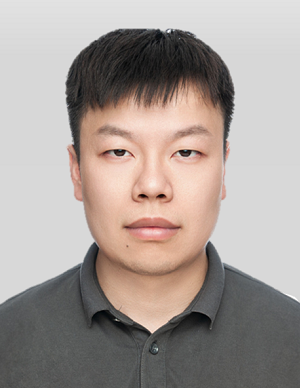
Chao Wei, Ph. D., Prof.
-
Principal Investigator
State Key Laboratory of Cognitive Science and Mental Health, IBP
Research Interests:
Email: weichao@ibp.ac.cn
Tel:
Address: 15 Datun Road, Chaoyang District, Beijing, 100101, China
Chinese personal homepage
- Biography
2007 - 2011 Sichuan University, B.S.
2013 - 2019 National Institute of Biological Sciences, Beijing & Peking University, Ph.D.
2019 - 2021 Chinese Institute for Brain Research, Beijing & Tsinghua University, Postdoctoral Fellow
2021 - 2024 Chinese Institute for Brain Research, Beijing, Postdoctoral Associate
2025 - Now Principal Investigator, Institute of Biophysics, Chinese Academy of Sciences
- Awards
2024 "Major Advances in Chinese Neuroscience"
- Membership in Academies & Societies
- Research Interests
Research Direction I: Cerebrovascular Biology
As a high-energy-consumption organ accounting for 20% of total body energy expenditure, the brain's millions of neural activities per second critically depend on precisely regulated oxygen/glucose delivery through cerebrovascular systems-an evolutionary marvel termed neurovascular coupling that represents nature's most sophisticated energy supply mechanism. Characteristically, cerebral endothelial cells establish a dynamically regulated blood-brain barrier (BBB) through exquisite coordination of tight junctions, transcellular transport, and plasma membrane integrity: while rigorously blocking pathogen invasion, toxic substance penetration, and peripheral immune cell infiltration, it enables selective molecular exchange via specialized transporters, tightly controlled transcytosis, sophisticatedly regulated membrane permeability. Our laboratory focuses on three pivotal questions: (1) What molecular and cellular mechanisms govern neurovascular coupling and BBB integrity? (2) How does dysregulation of these homeostatic mechanisms drive pathological cascades in stroke, sepsis-associated encephalopathy, neurodegenerative diseases, and other brain diseases? (3) Can we harness this knowledge to therapeutically modulate cerebral blood flow and BBB permeability for CNS disease intervention? Employing murine models and cutting-edge biomedical technologies, we: (1) Decipher molecular determinants through biochemical and genetic screening approaches; (2) Visualize neurovascular unit dynamics and BBB permeability via two-photon in vivo imaging; (3) Investigate neurovascular interactions at the systemic level using optogenetics, electrophysiology, and behavioral analyses. These efforts aim to decode brain-vasculature crosstalk and pioneer transformative therapies for CNS disorders.
Research Direction II: Neuroimmunology
Challenging the classical concept of "CNS immune privilege", we investigate dynamic neuro-immune interactions. Key objectives include: (1) Elucidating how CNS inflammation driven by aberrant microglial/astrocytic activation reshapes immune microenvironments to fuel disease progression; (2) Deciphering mechanisms whereby peripheral infections exacerbate neurodegeneration through hyperactivated immune pathways; (3) Uncovering CNS-mediated regulation of peripheral immunity during systemic inflammation. By integrating neuroscience and immunology approaches, we systematically dissect the dual roles of neuro-immune crosstalk in physiological homeostasis and pathological transformation, identifying novel therapeutic targets for Alzheimer's disease, gliomas, and related CNS disorders.
Technological Framework
Guided by our mission to "Decipher Shared Mechanisms in Brain Disorders, Bridge Basic-Clinical Translation," we have established an innovative pipeline spanning mechanistic exploration to clinical application:
Multi-scale Research System: A hierarchical framework integrating molecules, cells, neural circuits, and behavioral readouts for comprehensive investigation of brain disease pathogenesis.
Interdisciplinary Innovation: Converging advanced methodologies including biochemical assays, genetic screening, live-cell imaging, optogenetics, electrophysiologies and behavioral analysis.
Translational-Medicine Orientation: Collaborating extensively with clinical hospitals to develop breakthrough therapeutic strategies addressing unmet medical needs.
Talent Nurturing
In our laboratory, trainees will:
➢ Pioneer frontier researches tackling critical challenges in brain science
➢ Receive cross-disciplinary training integrating neurobiology and immunology
➢ Utilize state-of-the-art experimental platforms for high-impact research
➢ Fulfill scientific visions within a rigorous yet vibrant academic environment
We welcome motivated students with interdisciplinary vision and passion for exploring complex biomedical questions to join us in advancing cerebrovascular and neuroimmunology research!
- Grants
- Selected Publications
1. Chao Wei*#, Wei Jiang*, Minmin Luo, Feng Shao#; BBB breakdown caused by plasma membrane pore formation, Trends in Cell Biology, 2025 (*co-first author, #co-corresponding author)
2. Chao Wei*; Wei Jiang*; Ruiyu Wang; Haoyu Zhong; Huabin He; Xinwei Gao; Shilin Zhong; Fengting Yu; Qingchun Guo; Li Zhang; Lisa D. J. Schiffelers; Bin Zhou; Martin Trepel; Florian I. Schmidt; Minmin Luo#; Feng Shao#; Brain endothelial GSDMD activation mediates inflammatory BBB breakdown, Nature, 2024, 629: 893-900 (*co-first author, #co-corresponding author)
该成果被评为2024年度"中国神经科学重大进展"(第三完成人/共四位完成人)。
该成果被评为“中国2024年度重要医学进展”。
3. Chao Wei*; Xiao Han*; Danwei Weng; Qiru Feng; Xiangbing Qi; Jin Li#; Minmin Luo#; Response dynamics of midbrain dopamine neurons and serotonin neurons to heroin,nicotine,cocaine,and MDMA, Cell Discovery, 2018, 4:60 (*co-first author,#co-corresponding author)
4. Juen Zhang; Lubin Tan; Yuqi Ren; Jingwen Liang; Rui Lin; Qiru Feng; Jingfeng Zhou; Fei Hu; Jing Ren; Chao Wei; Tao Yu; Yinghua Zhuang; Bernhard Bettler; Fengchao Wang; Minmin Luo#; Presynaptic Excitation via GABAB Receptors in Habenula Cholinergic Neurons Regulates Fear Memory Expression, Cell, 2016, 166(3):716-728 (#co-corresponding author)
(From Chao Wei, April 22, 2025)

